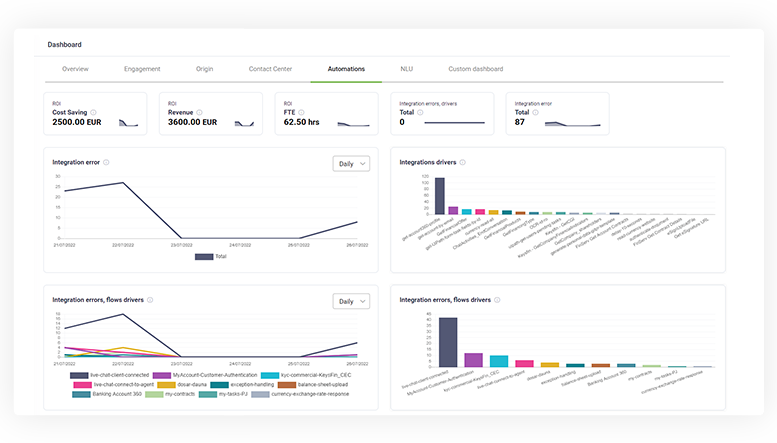By harnessing the power of conversational AI platforms, housing associations can revolutionize their operations, delight tenants with personalized services, seamlessly manage maintenance requests, effortlessly collect rent through automated reminders, and provide unparalleled accessibility.
Embracing this cutting-edge technology not only future-proofs their operations for the digital age but also positions them as frontrunners, gaining a significant competitive edge that propels them ahead of the competition. At the heart of all housing associations is the need to build great homes, offer affordable housing and provide the critical services that people need to create thriving communities. Yet today, housing associations face many challenges in providing quality services to their tenants while managing their operational costs, shrinking budgets and complying with regulations. They must always do more with less.
One of the ways they can overcome these challenges is by adopting conversational AI, a technology that enables natural and engaging interactions between humans and machines using voice or text. Conversational AI has become a game-changing technology in recent years and transformed various industries, and the housing association sector is no exception. With the help of conversational AI, housing associations can improve their processes, tenant experience, employee engagement, operational efficiency and innovation.
In this article, I explore ten practical examples of how conversational AI is helping housing associations.
Improving Tenant Communication, Satisfaction and Engagement
Tenants expect fast and convenient communication from their housing associations, especially when they have urgent issues or queries. Conversational AI can provide instant and accurate answers to frequently asked questions, such as payment schedules, lease terms, nuisance neighbours, repair requests or complaints. By using natural language processing (NLP), conversational AI can understand the intent and context of tenant requests and generate appropriate responses or actions.
For example, conversational AI can intelligently map the course of a specific issue through the repairs process, such as identifying the problem, generating an order for maintenance staff and scheduling an appointment with the tenant. This can significantly reduce response times, increase tenant satisfaction and improve the quality of service.
Personalized Customer Service Around the Clock
One of the most significant advantages of conversational AI is its ability to extend the reach of an organization's customer service, provide personalized customer service, as well as express its brand, voice and its tone. Housing associations can use conversational AI to transform how they engage with their customers in a more natural and conversational way. With the help of virtual AI assistants, customers can get instant responses to their queries and complaints. Housing associations can train their conversational AI assistants to understand customer intent and provide relevant responses.
For instance, a housing association can use conversational AI to handle rental inquiries. A customer can chat with the conversational AI assistant and ask for available rental properties. It can then provide a list of available properties based on the customer's preferences. This personalized service enhances the customer experience and reduces the workload of housing association employees.
Optimizing Operational Costs and Resources
Conversational AI can help housing associations improve their operational performance, reduce their operational costs and optimise their resources by streamlining processes, improving their efficiency and eliminating human errors. By automating tasks that would otherwise require human intervention, conversational AI can lower labour costs, increase accuracy and reduce errors. By providing real-time data and analytics, conversational AI can also help housing associations monitor their performance, identify issues and opportunities, and adjust their strategies accordingly.
For example, conversational AI can help housing associations manage their inventory of properties, equipment and materials. It can also help them optimize their energy consumption, maintenance schedules and waste management. Furthermore, conversational AI can help housing associations comply with regulations and standards by ensuring data quality, security and privacy.
Streamlined Maintenance Requests
An area where conversational AI can be useful for housing associations is its maintenance requests. Tenants can report issues with their properties through a virtual AI assistant. It can then collect information about the issue and schedule a maintenance appointment. The conversational AI assistant can also provide the tenant with updates on the status of the request. This process streamlines the maintenance request process and reduces the workload of housing association employees. It also ensures that maintenance requests are handled promptly, reducing the likelihood of property damage and increasing tenant satisfaction.
For example, conversational AI can help housing associations provide 24/7 service to their tenants via live chat, conversational AI assistants, or voice assistants. It can also help them integrate with other digital platforms and services, smart home devices that detect faults requiring service requests. During times of uncertainty and emergency, customer service operations powered by artificial intelligence (AI) can be invaluable, helping customer service call centres keep up with spikes in demand and reduce customer wait times and frustration.
Predictive Maintenance
Conversational AI can be used for predictive maintenance. Housing associations can use conversational AI assistants to collect data about the condition of their properties. A virtual AI assistant can ask tenants about any issues they are experiencing and collect data about the age and condition of appliances and fixtures. This data can then be analyzed to predict when maintenance will be required. Housing associations can then schedule maintenance appointments in advance, reducing the likelihood of unexpected breakdowns and upset tenants while simultaneously reducing repair costs.
Enhancing Employee Productivity and Collaboration
Conversational AI can also help housing association employees perform their tasks more efficiently and effectively. By automating repetitive and mundane tasks, such as data entry, reporting or scheduling, conversational AI can free up employees’ time and allow them to focus on more valuable and creative work. Conversational AI can also provide employees with relevant information and insights to help them make better decisions and solve problems faster when they are engaging with tenants.
For example, conversational AI can assist employees with accessing data from various sources, such as tenant profiles, property records or market trends. It can also provide suggestions and recommendations based on data analysis and best practices.
Innovating New Services and Solutions
Gartner predicts chatbots will become a primary customer service channel within four more years’ time. Why? Because AI-powered customer service has emerged as the fastest and most efficient approach for institutions to provide tailored, forward-thinking interactions that enhance customer involvement.
Conversational AI can help housing associations innovate new services and solutions that meet the changing digital needs and expectations of their tenants and stakeholders. By leveraging the power of generative AI, conversational AI can create its own training data and synthesise new responses that are relevant and engaging. By using advanced NLP techniques, such as sentiment analysis, emotion detection or personality profiling, conversational AI can also personalise interactions and tailor services to each tenant’s preferences and needs.
For example, conversational AI can help housing associations offer recommendations to tenants at the viewing stage of the process. It can also help them provide feedback surveys, loyalty programs or community events. Moreover, conversational AI can help housing associations explore new business models and revenue streams by creating new value propositions and partnerships.
Rent Collection and Reminders
Conversational AI can also be used for rent collection and reminders. With the help of conversational AI assistants, housing associations can send rent reminders to tenants via text or email. An intelligent virtual assistant can also provide tenants with information about their outstanding balances and due dates. This process eliminates the need for housing association employees to manually send reminders and chase tenants for payments.
In addition to rent reminders, conversational AI assistants can also handle rent payments. Tenants can make payments through the AI virtual assistant, which can provide receipts and confirmations. This process reduces the likelihood of late or missed payments and ensures that housing associations have a steady cash flow. In addition, enabling digital payments removes the need to talk to a housing association agent removing the embarrassment factor for some tenants who may be struggling financially. Data analytics from digital payments platforms can be analysed to determine who might be experiencing financial distress, enabling a housing association to intervene and offer meaningful financial advice and support before a tenant ends up in significant financial hardship.
Data Analytics and Insights
With many conversational AI platforms, you can access a data analytics platform that shows you key metrics in real-time, such as:
- The number of queries and responses
- Bot activity volume
- Bounce rate
- Bot conversation length
- Usage distribution by hour
- The number of conversations escalated to a live agent

DRUID Analytics Dashboard Capture
From these performance metrics, for example, housing associations can learn about the most frequent questions of their tenants. In turn, these insights can help housing leaders answer questions such as:
- What are my tenants’ common frustrations?
- What kind of repairs are my tenants requesting?
- How many incidents of anti-social behaviour (ASB) have been reported?
- Are my tenants pleased with the service they’re getting?
The answers to these questions can help housing associations further improve their tenant services and business operations.
Multilingual Chat Support
In 2021, people born outside of the UK made up an estimated 14.4% of the UK's population, or 9.5 million people with English as their second language. By deploying conversational AI assistants with multilingual features, housing associations can enhance their customer engagement. These intelligent virtual assistants can use multi-language APIs and conversational AI to translate tenant questions in real time, making their digital experience more convenient and more impactful.
Conclusion
Housing associations must increase their offering to their tenants and the wider public, year after year. They must build strong relationships within the community and continue to provide rent and services at a reasonably low-cost level.
With the help of conversational AI platforms, a technology that integrates with existing business applications, housing associations can automate their processes and enhance their customer experience and employee engagement. They can provide personalized customer service, streamline maintenance requests, aid rent collection by automating reminders, enhance service accessibility, and implement predictive maintenance routines that drive up service, operational efficiency levels and innovation.
By implementing conversational AI solutions, housing associations can also future-proof for the digital age and stay ahead of the competition. Conversational AI is not only a technology but also a strategic asset and a competitive advantage for housing associations.




